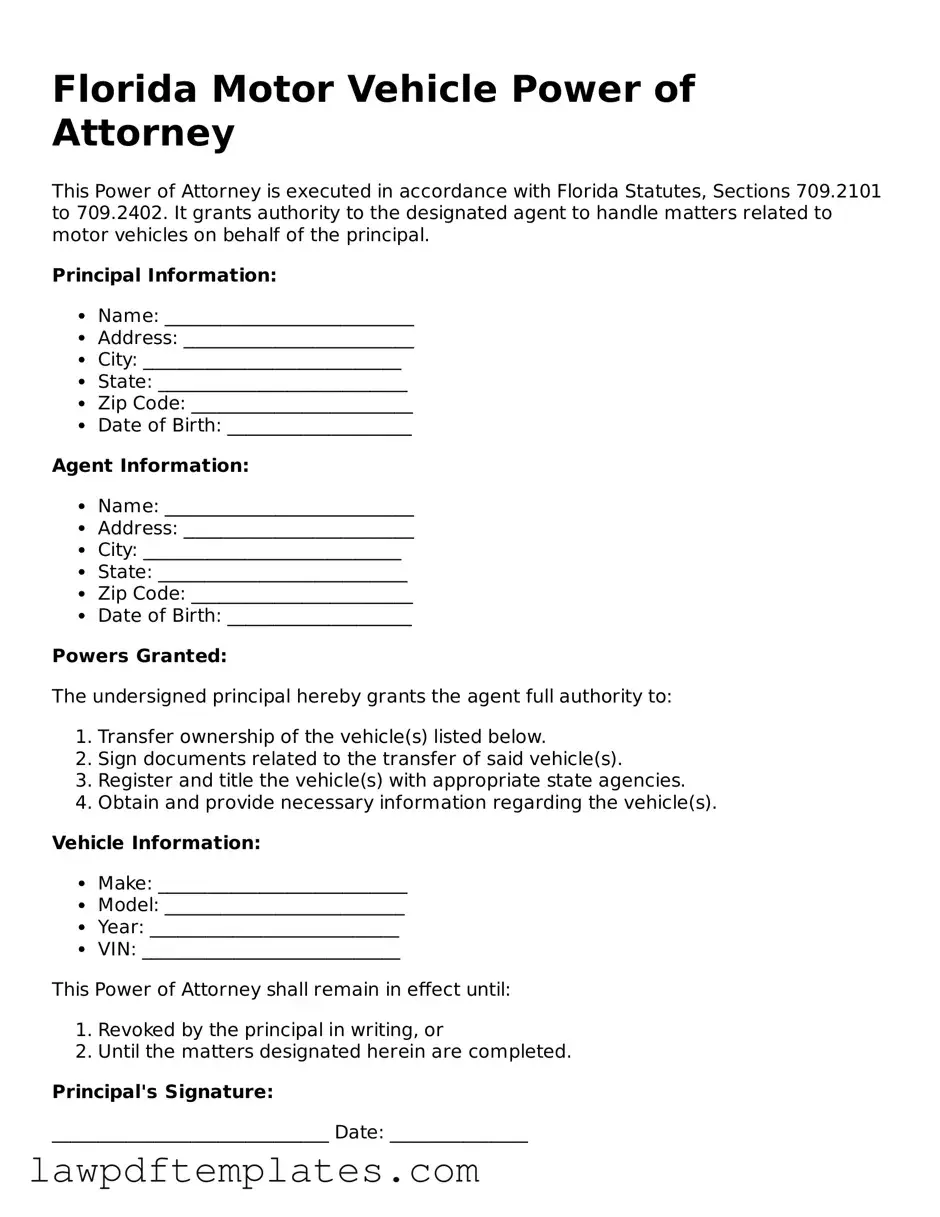Free Motor Vehicle Power of Attorney Template for the State of Florida
Form Breakdown
| Fact Name | Description |
|---|---|
| Definition | The Florida Motor Vehicle Power of Attorney form allows an individual to designate another person to handle specific motor vehicle-related tasks on their behalf. |
| Governing Law | This form is governed by Florida Statutes, specifically under Chapter 709, which deals with powers of attorney. |
| Usage | It is commonly used for tasks such as transferring vehicle titles, registering vehicles, and handling related paperwork. |
| Notarization Requirement | The form must be signed in the presence of a notary public to be legally valid in Florida. |
| Revocation | The principal can revoke the power of attorney at any time, as long as they provide written notice to the agent. |
| Agent's Responsibilities | The agent is expected to act in the best interest of the principal and must adhere to the limitations set forth in the document. |
| Duration | The power of attorney remains effective until revoked by the principal or until the principal passes away. |
Sample - Florida Motor Vehicle Power of Attorney Form
Florida Motor Vehicle Power of Attorney
This Power of Attorney is executed in accordance with Florida Statutes, Sections 709.2101 to 709.2402. It grants authority to the designated agent to handle matters related to motor vehicles on behalf of the principal.
Principal Information:
- Name: ___________________________
- Address: _________________________
- City: ____________________________
- State: ___________________________
- Zip Code: ________________________
- Date of Birth: ____________________
Agent Information:
- Name: ___________________________
- Address: _________________________
- City: ____________________________
- State: ___________________________
- Zip Code: ________________________
- Date of Birth: ____________________
Powers Granted:
The undersigned principal hereby grants the agent full authority to:
- Transfer ownership of the vehicle(s) listed below.
- Sign documents related to the transfer of said vehicle(s).
- Register and title the vehicle(s) with appropriate state agencies.
- Obtain and provide necessary information regarding the vehicle(s).
Vehicle Information:
- Make: ___________________________
- Model: __________________________
- Year: ___________________________
- VIN: ____________________________
This Power of Attorney shall remain in effect until:
- Revoked by the principal in writing, or
- Until the matters designated herein are completed.
Principal's Signature:
______________________________ Date: _______________
Witness Signature:
______________________________ Date: _______________
Notary Public:
______________________________ Date: _______________
My Commission Expires: ________________
Common mistakes
Filling out the Florida Motor Vehicle Power of Attorney form can seem straightforward, but many individuals make critical mistakes that can lead to complications. One common error is neglecting to provide complete information. When individuals fail to include necessary details, such as the full name and address of both the principal and the agent, it can create confusion and potentially invalidate the document.
Another frequent mistake is not properly signing the form. The principal must sign the document in the presence of a notary public. If this step is overlooked, the power of attorney may not hold up when it’s needed. It’s essential to ensure that all signatures are executed correctly and that the notary has completed their part of the process.
People often forget to specify the powers granted to the agent. A vague or overly broad description can lead to misunderstandings about what the agent is authorized to do. Clearly outlining the powers ensures that the agent understands their responsibilities and limits, preventing potential disputes down the line.
Additionally, failing to date the document is a common oversight. A date provides context for when the power of attorney becomes effective. Without it, there may be ambiguity regarding the timing of the authority granted, which can complicate matters when the form is presented for use.
Lastly, individuals sometimes overlook the importance of revoking previous powers of attorney. If a new power of attorney is created without explicitly revoking the old one, conflicts can arise. It’s crucial to clearly state that any prior power of attorney is revoked to avoid confusion and ensure that the agent's authority is unambiguous.
Discover More Motor Vehicle Power of Attorney Templates for Specific States
Title Transfer Nj - Streamline your vehicle transactions by enabling someone to act on your behalf with this power of attorney.
For those looking to create an efficient transaction record, utilizing templates can simplify the process, and you can find a reliable source at Fast PDF Templates, which offers tailored solutions for the Illinois Bill of Sale and other related documents.
How to Get Power of Attorney to Sell a Car - Grants permission for maintenance and registration activities for a vehicle.
